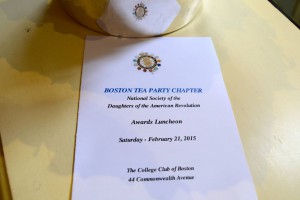 Program of the Boston Tea Party Chapter of the Daughters of the American Revolution. Photo by Karen M. True.
Program of the Boston Tea Party Chapter of the Daughters of the American Revolution. Photo by Karen M. True.
So you’ve decided to join a lineage society. Maybe you’ve found an ancestor who meets the qualification for a society you’ve known about for years. Or possibly you’ve just found out about a society that sounds really interesting and you want to join. Either way, deciding to join a lineage society is just the first in a series of decisions about your membership.
Probably the most important decision you’ll have to make is what you want to get out of your membership. Every society is structured differently, with some having local and state branches, and others with a single monolithic society. While there’s a lot of overlap, each society has different objectives. You might want to join a society that has a significant service component or one that focuses on a particular time or group of people in history that fascinates you. For example, I’m interested in witchcraft hysteria, and I enjoy being a member of Associated Daughters of Early American Witches with others who have an interest in and a connection to those events. If a particular aspect of history bores you to tears, you’re better off not joining a society that celebrates it. Regardless, if you only plan on joining for the sake of joining, what the society actually does is irrelevant.
On the other hand, if you’re planning on being active within your chosen lineage society, you’ll have to pay close attention to who the members are: are they people with whom you’ll want to spend your time? Some societies admit only men or only women, while others are co-ed. Does age range of the membership matter to you? Lineage societies tend to skew sexagenarian or older, but you can look for indicators that a particular organization seeks younger members. If a local chapter meets only Tuesday afternoons, then younger, working people aren’t likely to be members. Of course, the best way to decide if a society will be a good fit is to attend a meeting as a prospective member. If possible, try a few chapters before making your decision.
Joining a lineage society also entails making some budgetary decisions. Some societies require paying annual dues while others have a lifetime membership fee. Lifetime fees are sometimes optional or might kick in only after a certain age. If your finances can’t handle monthly luncheons at a country club, you might want to find a chapter that meets at a church or a library or one that meets less often.
The many types of lineage societies offer a wide range of options for members. Whatever you decide and whether you spend a little or a great deal of time on the application and participation in activities, may your time be well spent.
For more information, check out the webinar How to Apply to Lineage Societies: Tips from NEHGS by Lindsay Fulton.
Share this:
About Alyssa True
Alyssa True, library assistant, joined the NEHGS staff in 2011. She received a B.S. and a B.A. from Boston University and is currently completing her M.S. in library science, with a concentration in archives management, from Simmons College. Alyssa’s interests include Maine and lineage societies.View all posts by Alyssa True →